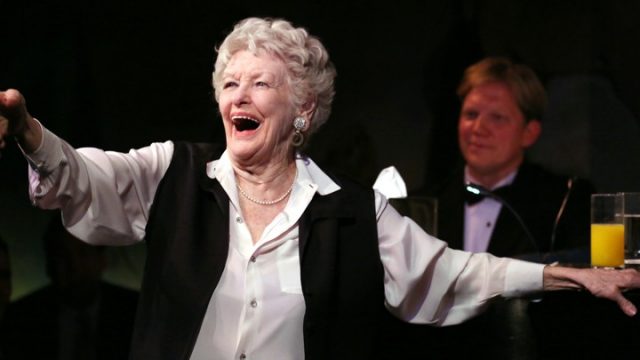Look, I love me some Patti LuPone. How could I not? But if I’m honest, she’s walking territory first conquered by—well, by Ethel Merman, who I do not love quite as much. But in more recent years, it was Elaine Stritch. Who died five years ago this week, part of quite a summer of loss, as we’ll be seeing in weeks to come. Stritch’s name probably wasn’t as well known to the average person as LuPone’s; LuPone has done considerably more not-Broadway media, I think, though they did both appear as attorneys on Law & Order. Everybody rise?
Her career spanned seventy years, starting in 1944. She actually understudied Ethel Merman in Call Me Madam, and it seems she spent a couple of decades bouncing around Broadway in minor roles, really breaking out in 1961, when it became clear that she was a better performer than technical star Jean Fenn in Noël Coward’s Sail Away. Apparently the main thing that worked in the show, possibly the only thing, was Stritch. And then she was given the role of Joanne in Company, and her record on Broadway was sealed.
As famous as she is for “Ladies Who Lunch,” and she should be, her performance of “I’m Still Here” is better for me. Honestly, I prefer LuPone’s “Ladies Who Lunch,” but while many, many women have done “I’m Still Here” over the years—starting, in fact, with Yvonne DeCarlo—it feels a bit like a continuation of Joanne to me, and having the same actress do both works for me. Stritch expressed the opinion that no one under eighty should be allowed to perform the role, and that doing it in your forties was silly, because where have you been? I’m not sure I’d go that far, but there’s no one who did it like Stritch.
Which I suppose is how you could sum up her career; no one did it like Stritch. She was loud and fierce, and she was really one of a kind. Merman didn’t have her grit; LuPone doesn’t have her world weariness. Merman did not, I think, do cynicism, which both Stritch and LuPone have in spades, but LuPone’s cynicism seems more inate, whereas Stritch is a cynic because she’s seen it all, done it all, been everywhere already. To me, she even had that sense when she was decades younger. It’s quite a trick.
I suppose that’s what happens when you become an alcoholic at fourteen to deal with, among other things, crippling stage fright. She also used it rather than dealing with her grief when her husband died. In the end, it probably contributed to the diabetes that killed her. Though goodness knows she had quite a run for anyone, alcoholism and diabetes notwithstanding, I mean, what, might she have gotten an eighty-year career?
Keep my writing career going; consider supporting my Patreon or Ko-fi!

